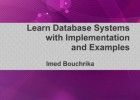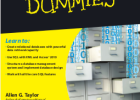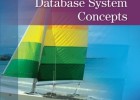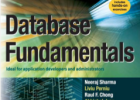Databases A Beginner’s Guide by Andrew J. Oppel
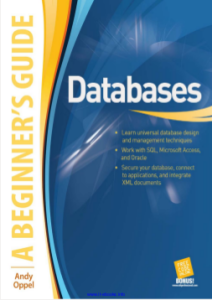 Learn standard database design and management techniques applicable to any type of database. Featuring clear examples using both Microsoft Access and Oracle, Databases: A Beginner’s Guide begins by showing you how to use Structured Query Language (SQL) to create and access database objects. Then, you’ll discover how to implement logical design using normalization, transform the logical design into a physical database, and handle data and process modeling. You’ll also get details on database security, online analytical processing (OLAP), connecting databases to applications, and integrating XML and object content into databases.
Learn standard database design and management techniques applicable to any type of database. Featuring clear examples using both Microsoft Access and Oracle, Databases: A Beginner’s Guide begins by showing you how to use Structured Query Language (SQL) to create and access database objects. Then, you’ll discover how to implement logical design using normalization, transform the logical design into a physical database, and handle data and process modeling. You’ll also get details on database security, online analytical processing (OLAP), connecting databases to applications, and integrating XML and object content into databases.
Designed for Easy Learning
-
Key Skills & Concepts–Chapter-opening lists of specific skills covered in the chapter
-
Ask the Expert–Q&A sections filled with bonus information and helpful tips
-
Try This–Hands-on exercises that show you how to apply your skills
-
Notes–Extra information related to the topic being covered
-
Self Tests–Chapter-ending quizzes to test your knowledge
Reviews:
As a database programmer for 15 years, I like to re-enforce my knowledge of a skill by getting back to the basics once in a while. This book by Andy Oppel explained database concepts very well. I tried to put myself in the mind of a newbie to see how these concepts would present themselves to me as such. Mr. Oppel has succeeded very well. He takes from an overview to SQL, normalization, logical and physical database design, through more advanced subjects like UML, XML and OLAP. Now, this book won’t substitute a full course-load at your college or university, but, it will get you started if you’ve been “volunteered” to get a database up and running at your office.
Mr. Oppel doesn’t focus on any particular database package, and that’s good; you can apply these concepts to Oracle, Access, MySQL, etc. There is even a chapter focusing on SQL that assumes you’re using Oracle.
Note that the author doesn’t provide any SQL batch programming; it’s not a programming book at all. He just gets you up and running.
In sum, a good companion book to your college level intro to database theory textbook. Since Mr. Oppel teaches this at the college level, he provides questions at the end of each chapter. I recommend you answer them for yourself, if you are going this alone.
Another Review:
I’m a CS major taking this book for a DB course, and I’m a little stumped at the business examples.
I’ve never taken a business/accounting course, so the examples dealing with purchase orders, invoices, etc.
are a little over my head, and frequently baffling. The textbook probably is better for business majors, or people in the real
world who’ve had to deal with these things, rather than straight up CS majors who, well, probably haven’t.
Another Review:
Firstly a caveat – I have not actually read this book. I am an experiences SQL designer and found this book in my local library. From flicking through it an a scan read it appears to cover all the major topics such as 1st, 2nd, 3rd normal form, indexing, security and administration in a comprehensive and accessible manner for those who are technically minded but inexperienced with databases. If you are – say – an accountant or business manager and need to understand how to get information into and out of your corporate systems then I would say that this book is a very good place to start. It is mainly focused on SQL standards but is not proprietry to MSSQL, MySql or mSQL
[info]You can buy this book from Amazon by clicking here[/info]
[info]Click here to download the PDF file from an external site.[/info]
